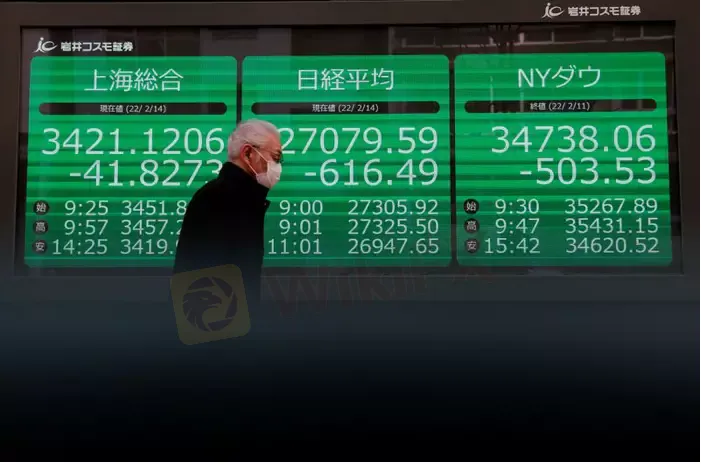简体中文
繁體中文
English
Pусский
日本語
ภาษาไทย
Tiếng Việt
Bahasa Indonesia
Español
हिन्दी
Filippiiniläinen
Français
Deutsch
Português
Türkçe
한국어
العربية
Google gives jittery stocks a lift ahead of Fed
Abstract:Better-than-expected results at Microsoft and Google helped soothe a nervous mood in stock markets on Wednesday, while a cut in Russian gas flow dragged on the euro and a Federal Reserve meeting due later in the day kept bonds and the dollar on edge.

Nasdaq 100 futures bounced 1.4% and S&P 500 futures were up 0.8% in Asia after Microsoft forecast steep revenue growth and Google parent Alphabet posted strong search engine ad sales.
Alphabet shares rose 5% after hours and Microsoft shares rose 4% to cut through some of the gloom cast over Tuesday by a profit warning at retailer Walmart and some soft U.S economic data.
MSCI‘s broadest index of Asia-Pacific shares outside Japan fell 0.6% and Japan’s Nikkei fell 0.3%.
The Federal Reserve is expected to announce a 75 basis point rate hike at 1800 GMT but investors are wary of a surprise in either direction and have preferred safe assets such as dollars.
“The market is trying to convince itself that peak inflation has happened,” which would be a basis for more clarity and confidence about future rates and growth, said ING economist Rob Carnell, but that means a Fed that is staying the course.
“(The Fed) does need to give the sense that fighting inflation is their number one priority, otherwise the sense is that inflation will stay higher for longer,” he said.
Australian data sounded something of a warning on Wednesday, with headline consumer prices rising at their fastest pace in two decades.
In the United States a 75 bp hike is fully priced on Wednesday, but futures imply about a 15% chance of a 100 bp hike. The Treasury market is already anticipating that near-term hikes will hurt longer-run growth.
Benchmark 10-year Treasury yields were steady at 2.8068% on Wednesday, below two-year yields at 3.0528%. [US/]
EUROPE, CHINA WOBBLY
On top of worries about interest rates damaging economies, Europe faces an energy crisis and China is beset by restrictive COVID-19 policies and fresh fears of a property market collapse.
The euro had its worst session in a fortnight on Tuesday, sliding 1%, as Russias Gazprom said it would further cut westbound gas flow and energy prices zoomed higher.
It steadied at $1.0145 in Asia. The Australian dollar was marginally lower at $0.6923. The Japanese yen steadied at 136.96 per dollar.
Chinas yuan was under pressure and property stocks fell as investors have been spooked that a widening boycott of mortgage repayments on unfinished apartments can ricochet around the development and banking industries.
The onshore CSI real estate index fell 2% and a Hong Kong index of mainland developers fell more than 5%, dragged down by large developer Country Garden announcing a discounted share sale.
“Chinas housing sector is in the midst of a depression and the recent mortgage boycott is a sign of the severity of the downturn,” said analysts at Societe Generale.
“The extent of this boycott, as it is now, is not unmanageable, but there is a risk of escalation.”
Europes soaring gas prices kept oil firm. Brent crude futures were steady at $104.30 a barrel. U.S. crude futures rose 0.1% to $95.14 a barrel.

Disclaimer:
The views in this article only represent the author's personal views, and do not constitute investment advice on this platform. This platform does not guarantee the accuracy, completeness and timeliness of the information in the article, and will not be liable for any loss caused by the use of or reliance on the information in the article.
Read more

Top 10 Trading Indicators Every Forex Trader Should Know
Master the top 10 Forex trading indicators to analyze real-time Forex quotes, trends, and market signals. Learn strategies to boost accuracy and avoid mistakes.

Geopolitical Events: What They Are & Their Impact?
You've heard many times that geopolitical events have a significant impact on the Forex market. But do you know what geopolitical events are and how they affect the FX market? Let us learn about it today.

Why Do You Feel Scared During Trade Execution?
Trade execution is a pivotal moment for traders. It is when analysis turns into action, and potential profits or losses become reality. However, for many traders, this moment is accompanied by fear. Why does this happen, and how can you address it?

WikiEXPO Global Expert Interview: Simone Martin—— Exploring Financial Regulation Change
In the midst of financial innovation and regulation, WikiGlobal, the organizer of WikiEXPO, stays abreast of industry trends and conducts a series of insightful and distinctive interviews on pivotal topics. We are delighted to have the privilege of inviting Simone Martin for an in-depth conversation this time.
WikiFX Broker
Latest News
Geopolitical Events: What They Are & Their Impact?
Volkswagen agrees deal to avoid Germany plant closures
Top 10 Trading Indicators Every Forex Trader Should Know
TradingView Launches Liquidity Analysis Tool DEX Screener
MultiBank Group Wins Big at Traders Fair Hong Kong 2024
WikiEXPO Global Expert Interview: Simone Martin—— Exploring Financial Regulation Change
'Young investors make investment decisions impulsively to keep up with current trends' FCA Reveals
Why Do You Feel Scared During Trade Execution?
CySEC Settles Compliance Case with Fxview Operator Charlgate Ltd
Malaysian Influencer Detained in Taiwan Over Alleged Role in Fraud Scheme
Currency Calculator


